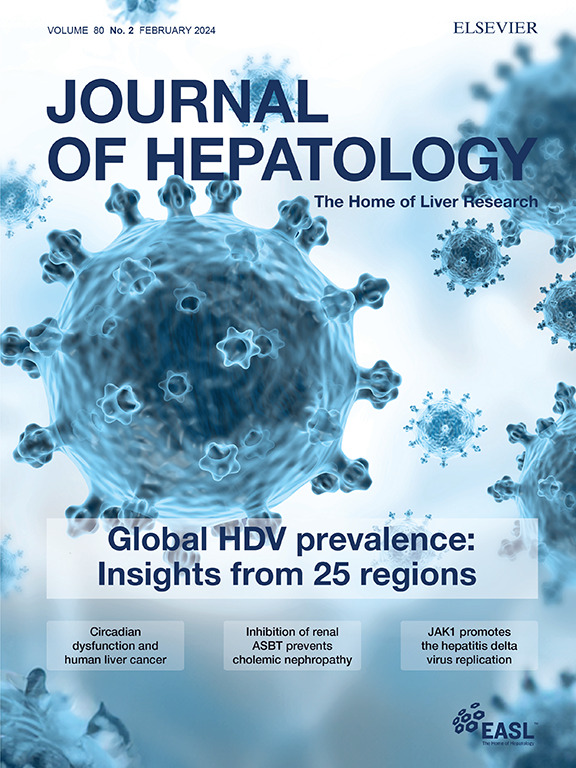Safety and efficacy of elafibranor in primary sclerosing cholangitis: The ELMWOOD phase II randomized-controlled trial
IF 26.8
1区 医学
Q1 GASTROENTEROLOGY & HEPATOLOGY
引用次数: 0
Abstract
Background & Aims
Primary sclerosing cholangitis (PSC) is a rare, chronic liver disease. Elafibranor, a dual peroxisome proliferator-activated receptor-α/δ agonist, was investigated in the phase II ELMWOOD trial (NCT05627362).Methods
This 12-week, double-blind trial enrolled adults with PSC and alkaline phosphatase (ALP) ≥1.5× the upper limit of normal. The primary endpoint was elafibranor safety vs. placebo. Additional endpoints included relative mean change from baseline in ALP and enhanced liver fibrosis (ELF) score.Results
A total of 68 participants (male: 54.4%; mean age: 46.3 years; inflammatory bowel disease: 55.9%) were randomized to elafibranor 80 mg (n = 22), elafibranor 120 mg (n = 23), or placebo (n = 23). At baseline, 70.6% were on ursodeoxycholic acid, 48.5% had ELF scores >9.8, and the mean ALP level was 369.5 U/L. At Week 12, rates of treatment-emergent adverse events (TEAEs) and TEAEs leading to discontinuation in participants on elafibranor 80 mg, 120 mg, and placebo were 68.2%, 78.3%, and 69.6%, and 4.5%, 4.3%, and 8.7%, respectively. Serious TEAEs occurred only in participants on placebo (4.3%). Participants on elafibranor 80 mg and 120 mg had reductions in ALP vs. placebo (least squares mean treatment difference [95% CI]: −35.3% [−49.2, −21.4] and −54.7% [−68.3, −41.0], respectively). ALP normalization occurred only in participants on elafibranor 80 mg (9.1%) and 120 mg (17.4%). The LS mean treatment differences (95% CI) in change from baseline in ELF scores in participants on elafibranor 80 mg and 120 mg vs. placebo were –0.19 (−0.52, +0.15) and –0.28 (−0.62, +0.06), respectively.Conclusions
Elafibranor was well tolerated in people with PSC and associated with greater biochemical improvements over 12 weeks compared with placebo. A greater magnitude of response was observed with elafibranor 120 mg compared with 80 mg.Impact and implications
For people with primary sclerosing cholangitis (PSC), there is a need for a well-tolerated and effective treatment that will enhance quality of life, prevent disease progression, and improve long-term outcomes. Here, we present results from the double-blind period of the phase II ELMWOOD trial in PSC, wherein elafibranor, a peroxisome proliferator-activated receptor-α/δ agonist, demonstrated a favorable safety profile, provided greater biochemical improvements over 12 weeks compared with placebo, and appeared to stabilize markers of fibrosis and improve pruritus. These findings support larger and longer term investigations of elafibranor to explore its therapeutic potential as a treatment for people with PSC.

ELMWOOD II期随机对照试验:elafbranor治疗原发性硬化性胆管炎的安全性和有效性
背景,目的原发性硬化性胆管炎(PSC)是一种罕见的慢性肝病。Elafibranor是一种双过氧化物酶体增殖物激活受体-α/δ激动剂,在ELMWOOD II期试验(NCT05627362)中进行了研究。方法采用双盲方法,招募PSC、碱性磷酸酶(ALP)≥1.5倍正常值上限的成人患者,为期12周。主要终点是elafibranor与安慰剂的安全性。其他终点包括ALP相对于基线的平均变化和肝纤维化增强(ELF)评分。结果共68例受试者,其中男性占54.4%;平均年龄46.3岁;炎症性肠病患者:55.9%)被随机分到80mg艾拉布诺组(n = 22)、120mg艾拉布诺组(n = 23)或安慰剂组(n = 23)。基线时,70.6%的患者服用熊去氧胆酸,48.5%的患者ELF评分为9.8,平均ALP水平为369.5 U/L。在第12周,治疗中出现的不良事件(teae)和导致患者停药的teae分别为68.2%、78.3%和69.6%,以及4.5%、4.3%和8.7%。严重teae仅发生在安慰剂组(4.3%)。与安慰剂相比,接受elafbranor 80 mg和120 mg治疗的受试者ALP降低(最小二乘平均治疗差[95% CI]分别为- 35.3%[- 49.2,- 21.4]和- 54.7%[- 68.3,- 41.0])。ALP正常化仅发生在服用艾非布诺80 mg(9.1%)和120 mg(17.4%)的参与者中。elafbranor 80 mg和120 mg受试者与安慰剂受试者的ELF评分基线变化的LS平均治疗差异(95% CI)分别为-0.19(- 0.52,+0.15)和-0.28(- 0.62,+0.06)。结论:与安慰剂相比,selafibranor在PSC患者中耐受性良好,并且在12周内具有更大的生化改善。与80 mg相比,120 mg的埃拉布诺有更大的反应。影响和意义对于原发性硬化性胆管炎(PSC)患者,需要一种耐受性良好且有效的治疗方法,以提高生活质量,预防疾病进展,改善长期预后。在这里,我们展示了PSC II期ELMWOOD试验的双盲期结果,其中elafibranor,一种过氧化物酶体增殖体激活受体-α/δ激动剂,显示出良好的安全性,与安慰剂相比,在12周内提供了更大的生化改善,并且似乎稳定了纤维化标志物并改善了瘙痒。这些发现支持对elafibranor进行更大规模和更长期的研究,以探索其作为PSC患者的治疗潜力。
本文章由计算机程序翻译,如有差异,请以英文原文为准。
求助全文
约1分钟内获得全文
求助全文
来源期刊

Journal of Hepatology
医学-胃肠肝病学
CiteScore
46.10
自引率
4.30%
发文量
2325
审稿时长
30 days
期刊介绍:
The Journal of Hepatology is the official publication of the European Association for the Study of the Liver (EASL). It is dedicated to presenting clinical and basic research in the field of hepatology through original papers, reviews, case reports, and letters to the Editor. The Journal is published in English and may consider supplements that pass an editorial review.
 求助内容:
求助内容: 应助结果提醒方式:
应助结果提醒方式:


